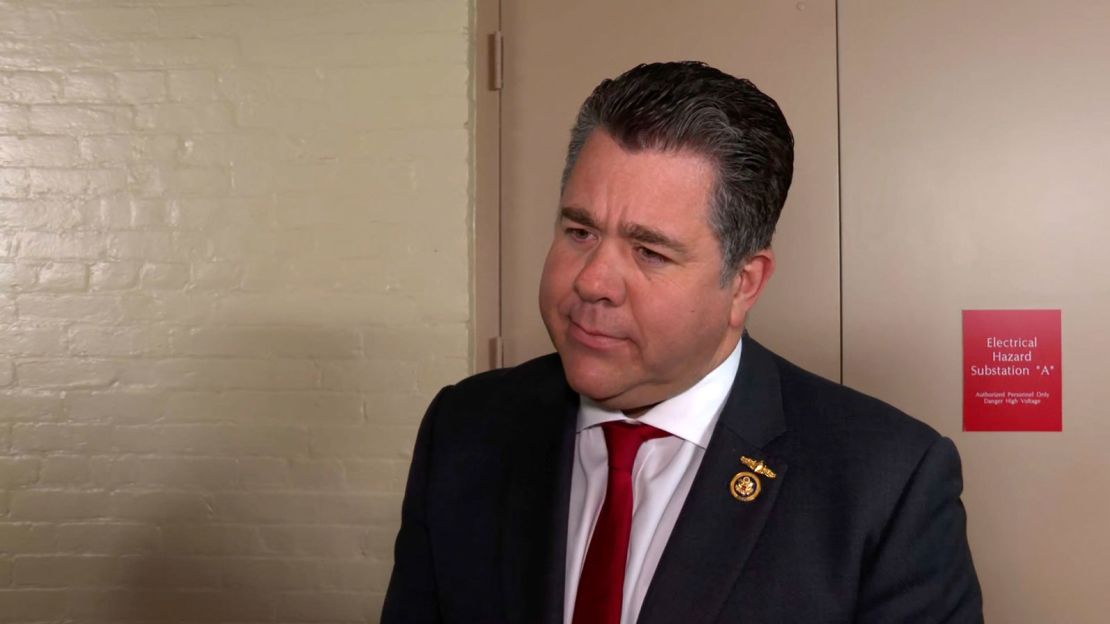CNN
—
With President Donald Trump’s agenda on the line, Speaker Mike Johnson is stuck in the middle between two disgruntled factions of the House GOP that want completely different things. If he can’t find a way to appease both, it could derail the whole bill.
Nearly a dozen House hardliners are threatening to oppose their party’s tax and budget bill because, they argue, it doesn’t cut enough in spending. But separately, another half-dozen GOP centrists are also refusing to support it without billions more in state and local tax breaks.
As Johnson and his leadership team barrel toward a floor vote in exactly one week, House Republicans are anxiously watching the collision course between the two opposing factions, which – as of Wednesday – is enough to doom the bill on the floor. Johnson plans to huddle separately Thursday morning with both factions in a last-ditch attempt to stave off a revolt.
“We’re a long ways away from having a product that I think has anywhere close to 218 votes,” Rep. Chip Roy, a conservative hardliner, told CNN, adding that he counts “probably 20” specific problems with the bill – and that’s before any deal Johnson makes with GOP centrists on state and local taxes.

But one of those centrists, Rep. Mike Lawler of New York, made clear that he is also opposed without changes.
“As this stands right now, I am a no, and so they’re going to need to come up with a solution here and quickly, if they want to stay on the schedule that they’ve outlined,” Lawler told CNN.
GOP leaders insist they will unify their ranks just as they’ve done before on tough votes on costly debt limit hikes and spending bills.
But this bill is already resulting in a messy clash that jeopardizes Johnson’s goal of passage next week – while previewing even more drama to come as the House and Senate attempt to reconcile their own differences in order to achieve the near-universal Republican support needed to get it through both chambers. (Some of that friction emerged Wednesday, when Sen. Josh Hawley trashed the House GOP bill in an interview that was widely shared among House lawmakers.)
Johnson has faced plenty of conservative rebellions before. But this time, he is also contending with swing district New Yorkers who are threatening to blow up the proposal if they don’t get a more generous deduction for their constituents’ state and local taxes.
Tensions are spilling into the open. New York centrists are railing against House Ways and Means Chairman Jason Smith. Conservatives are demanding those New Yorkers get in line. Further complicating matters, a spurned Republican Rep. Elise Stefanik – who saw her Cabinet nomination pulled because of concerns over Johnson’s slim GOP majority – has joined the side of the GOP centrists against Johnson.
Rep. Eric Burlison of Missouri told reporters Wednesday that members of the so-called SALT caucus – which demanded the state and local tax breaks – needed to “stop b*tching about the areas we’re looking to make cuts.”
“They’re asking for something that’s very costly, but yet they’re not willing to find the savings,” Burlison said Wednesday. “You can’t have your cake and eat it too.”
But the members of that SALT caucus see it far differently.
“Look, everybody is going to have their voices heard in this process, but the reality is that the number that matters is 218,” Lawler said, referring to the number of votes typically needed to pass a bill in the House.
As Johnson attempts to win over GOP hardliners in the House Freedom Caucus, several of those members will soon have their chance to voice public disapproval on leadership’s plan – and possibly even keep it from a floor vote.
The House Budget Committee – which is packed with fiscal hawks who already forced party leaders to promise bigger spending cuts – will meet on Friday to formally prepare the various pieces of the bill for the floor.
At least three GOP budget committee members – Roy, South Carolina Rep. Ralph Norman and Georgia Rep. Andrew Clyde – have said they need to see changes before they can support the bill. After that Friday meeting, the bill will also have to make it through the House Rules Committee, on which Roy and Norman also sit.
One of the biggest complaints from the right wing is that the House GOP plan to implement work requirements for certain Medicaid recipients takes too long to go into effect. Conservatives spent Wednesday morning at a private GOP conference meeting railing against a phase-in period to the Medicaid work requirements, which they argue is too slow, according to a person in the room.
“It’s gotta be now. It can’t be tomorrow,” Norman, a member of the House Freedom Caucus, said of the Medicaid changes.
Energy and Commerce Chairman Brett Guthrie, for his part, defended his decision to phase the changes in gradually. Guthrie – whose committee was in the middle of a 24 hour-plus debate on the bill – said he wrote a bill that could pass muster in in the committee while winning support from swing district Republicans.
“We picked the date on our committee as a consensus of the committee,” Guthrie said. “As we move to the floor, we’ll all have to work together to see what the right date is.”
Those battleground Republicans have said that they back the work requirements, but argued people need time to make accommodations to meet them.
But Rep. Andy Harris, who leads the House Freedom Caucus, offered a clear rebuke of that move, posting on X: “What a joke. The swamp is real.”
While conservative attacks against the bill mounted Wednesday, Johnson has been in almost near constant contact with the SALT caucus for days, including a group text thread with a handful of lawmakers, including Stefanik – a member of his leadership team.
But those SALT members, including Rep. Nick LaLota of New York, have so enraged members of the House Ways and Means Committee that the two groups are no longer talking. The drama escalated Tuesday night, when LaLota booted one of those Ways and Means members – fellow New York Rep. Nicole Malliotakis out of a private SALT meeting with the speaker, which further infuriated the tax-writing panel.

“The committee has gone incommunicado with us. It seems to me, they don’t want their committee bill to pass the floor. Otherwise, they would be negotiating with the SALT members,” LaLota told reporters Wednesday.
Inside that Johnson meeting on Tuesday night, Johnson made another offer to the SALT group that went far above the Ways and Means initial proposal. On Tuesday night, leadership unveiled a plan that would increase the deduction from $10,000 where it currently sits to $40,000 for single filers and $80,000 for married couples. (The committee’s version sits at $30,000 per person.)
But Johnson’s offer came with conditions: That higher deduction was only in law for five years, before returning back to $10,000 – which several members involved in the talks said was untenable.
The task of navigating a deal with the New Yorkers has landed entirely in Johnson’s lap after Ways and Means Chairman Jason Smith made clear in an earlier meeting that he saw his job as getting the bill through his committee, not negotiating a separate deal with a few hold outs who don’t sit on Ways and Means, according to three people familiar with the meeting.
So far, Trump hasn’t injected himself into the disputes, but both conservatives and swing district members are using the President’s promises from the campaign trail as signs that Trump would ultimately back their position.
“There’s no deal without a true SALT fix, a fix that the President campaigned on when he was campaigning throughout the country,” LaLota said, noting a campaign rally Trump held on Long Island last October where he called for lifting SALT caps.
Trump – who has never been seen on Capitol Hill as detail-oriented on policy – could ultimately be a key arbiter in the debate as members want to avoid crossing him on his signature piece of legislation. But so far, the president hasn’t weighed in.
Neither has the Senate, at least not yet. GOP leadership has made clear that there are several pieces of the House’s proposal that will be changed in their chamber further complicating the process in the weeks ahead.
“Obviously, there’s 53 Republican senators who want to have their own thoughts and ideas Incorporated. It’s a process and one that I think has a number of stages yet to get through,” GOP Majority Leader John Thune said.
Hawley insisted Wednesday the House bill would not pass the Senate in its current form, arguing its Medicaid provisions amount to a “tax” on poor Americans.
“This is real Medicaid benefit cuts. I can’t support that. No Republican should support that,” Hawley, whose state of Missouri relies heavily on the program, told CNN.
“We’re the party of the working class. We need to act like it.”
CNN’s Alison Main and Haley Talbot contributed to this report.

